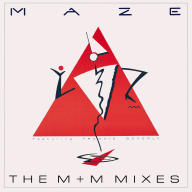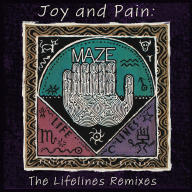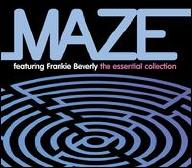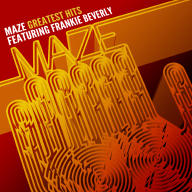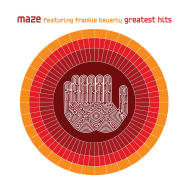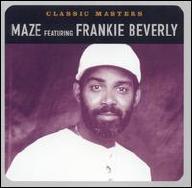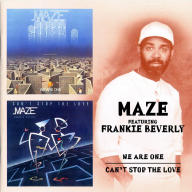Feeling out of place in his home town, Beverly moved Raw Soul to the San Francisco Bay Area in 1971. Raw Soul had been playing the San Francisco/Oakland scene for several years when Beverly's idol, Marvin Gaye, became aware of the band. Quite impressed by Beverly's singing and songwriting, Gaye sang Raw Soul's praises to Capitol and helped them land a deal with that major label in 1976. One thing Gaye didn't like about Beverly's band was the name Raw Soul. The late soul giant insisted on a name change and after considering a few other names (including Karma and Charisma), Raw Soul officially became Maze Featuring Frankie Beverly in 1976. (The name Karma wouldn't have worked because an obscure, L.A.-based funk/jazz outfit called Karma was recording for AM around 1976-1977).
Maze's self-titled debut album was released by Capitol in 1977; that album (which contains the hits Happy Feelin's, While I'm Alone, and Lady of Magic) went gold and earned Maze an extremely devoted following. The band's 1977 lineup consisted of Beverly on lead vocals and rhythm guitar, Wayne Thomas on lead guitar, Sam Porter on keyboards, Ronald Roame Loary and McKinley Bug Williams on percussion and background vocals, and Joe Provost on drums. In 1978, Provost was replaced by Ahaguna G. Sun, formerly of a little-known soul/funk group called Sunbear; subsequently, Sun was replaced by Billy Shoes Johnson. There were other personnel changes along the way; keyboardist Phillip Woo (formerly of Roy Ayers' band Ubiquity) joined Maze in 1980, and Ron Smith was the guitarist who replaced Thomas. But regardless of who was coming or going, Maze always reflected Beverly's vision -- Beverly was to Maze what George Clinton was to Parliament/Funkadelic. 1978 saw the release of Maze's second album, Golden Time of Day, which contains the number-nine RB hit Workin' Together. Golden Time of Day went gold, as did 1979's Inspiration and 1980's Joy and Pain (the album that gave us the major hit Southern Girl). In the late '70s, Maze earned a reputation for having one of the best live shows in RB and their first live album, Live in New Orleans (a two-LP set), came out in 1981. Another live double-LP, Live in Los Angeles, was released in 1986, which was the year after Maze's funky Back in Stride reached number one on Billboard's RB singles chart and became their biggest hit ever.
In 1989, Maze left Capitol for Warner Bros. and recorded Silky Soul; the title track, an ode to Marvin Gaye, was a major hit. By that time, Maze was receiving a lot of attention from the rap world -- their recordings were being sampled extensively by hip-hoppers. In 1988, rapper Rob Base used the chorus of Maze's Joy and Pain on a single that had the same title -- unfortunately, Base did so without permission and Beverly threatened legal action. Maze didn't enjoy many hits in the '90s, although their live shows continued to be well-received by a very devoted fan base. ~ Alex Henderson, Rovi


